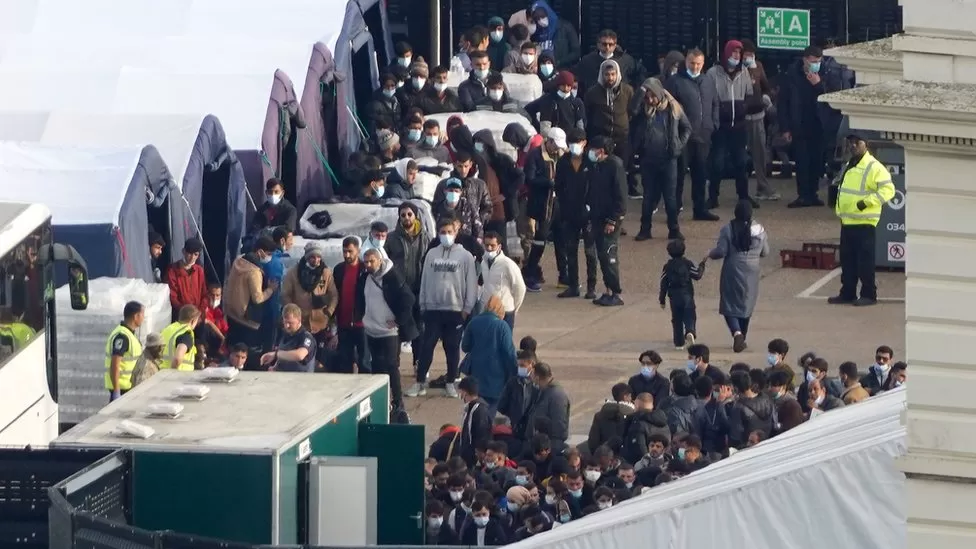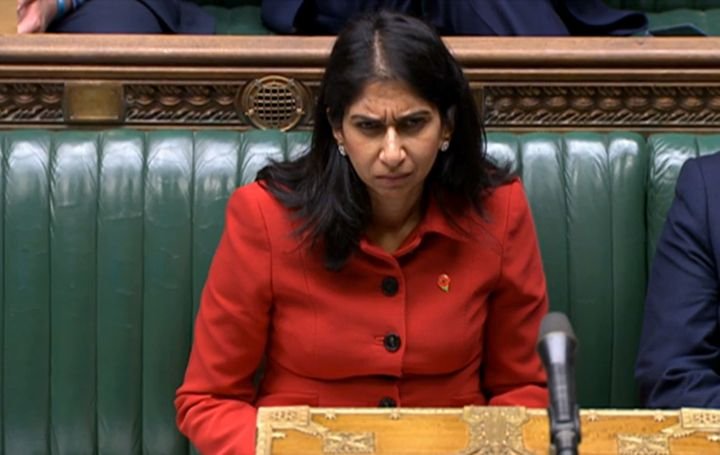Warning long read…
Stopping small boats is ‘priority’ for British people, says Rishi Sunak and he claims he is up for a fight…
Sunak says he is up for the fight on illegal Channel crossings but this is much more complex than that.
Rishi Sunak has said he is “up for the fight” to bring in new legislation to prevent migrants from crossing the Channel on small boats to reach the UK.
The prime minister said he was confident the government would win any legal battles over the “tough, but necessary and fair” measures.
Earlier his home secretary, Suella Braverman, announced the bill during a divisive debate in Parliament.
The announcement of the bill was met with heated discussion during a divisive debate in Parliament, with Labour denouncing the Conservatives’ plans as a “con” and likening them to “groundhog day.” However, the proposed legislation has also attracted criticism from the UNHCR, which has argued that it amounts to an “asylum ban.”
Standing behind a lectern emblazoned with the slogan “stop the boats“, Mr Sunak confirmed the planned new law, which will see illegal migrants deported “within weeks”, would apply retrospectively to everyone arriving in the UK illegally from Tuesday.
He said he knew there would be a debate about the toughness of the Illegal Migration Bill but the government had tried “every other way” of preventing the crossings and they had not worked.
Despite acknowledging the complexity of the issue and the lack of a “silver bullet” solution, Sunak emphasized that the government had explored “every other way” of addressing the issue and that he was confident he could deliver a successful outcome. With more than 45,000 people having entered the UK via Channel crossings last year, up from just 300 in 2018, the urgency of the issue is clear.
Of course, this could all be just dog whistle politics but for two things. One, there is a clear issue with the entire asylum system throughout Europe and two, Starmer’s only condemnation is that the Tories are failing on targets. Let’s look at Starmer first…
The Moral Decline of Labour: Sir Keir Starmer’s Party Accused of Amplifying Tory Dog-Whistles
Sunaks claims he is up for a fight and Starmer’s joined him in the corner, cheering him on.
Labour will:
— Keir Starmer (@Keir_Starmer) March 8, 2023
Crack down on smuggler gangs.
Clear the asylum backlog.
Strike return agreements with safe countries.
Reform legal routes for refugees.
13 years of Tory failure has let criminal gangs off the hook and left thousands of asylum claims unprocessed. pic.twitter.com/nAVwyOoLp7
The Red Tories formally known as the Labour Party are playing a dangerous game claiming the Blue Tories have failed because they have not met targets.
The recent actions of Sir Keir Starmer’s Labour Party have been met with widespread condemnation, as they have been accused of lending a disturbingly sympathetic ear to the xenophobic and anti-immigrant rhetoric that has long been the trademark of the Tory Party.
It is a troubling development that a party that once stood for the interests of the marginalised and the oppressed now appears to be pandering to the very prejudices that have historically been used to divide and conquer the working classes.
Stephen Kinnock is Shadow Minister for Immigration
— Tom London (@TomLondon6) March 7, 2023
He uses similar dehumanising language to Braverman on the small boats
WHAT is the point of Starmer’s Labour? https://t.co/wQav7lvY5A
This shameful display of political expediency must be called out for what it is: a cynical attempt to curry favour with the most reactionary elements of society, at the expense of the vulnerable and the dispossessed.
Labour said the Tories’ latest plans were like “groundhog day” and a “con”.
It is high time that the Labour Party reclaims its moral compass and stands up for the values of justice and fairness that it once held dear. The alternative is a descent into the dark abyss of bigotry and hate, from which there can be no escape.
What’s the reality of whos coming and whos going?

In 2022, 45,755 men, women and children crossed the Channel in small boats to reach the UK, most of whom then claimed asylum. In comparison that is more than the population of Dover the small town close to the channel landing. Nearly 3,000 people have already made the crossing this year, with official estimates expecting more than 80,000 this year.
The make-up of people on small boats has been changing. From January 2018 to June 2022, Iranian (28%) and Iraqi (20%) nationals represented nearly half of all small boat arrivals. In the first six months of 2022, over half (51%) of small boat arrivals were from three nationalities – Albanian (18%), Afghan (18%) and Iranian (15%).
However, since May 2022, there has been a significant increase in the number of Albanians crossing the channel on small boats. From May to September 2022 Albanian nationals alone comprised 42% of small boat crossings.
There has been a rapid increase in the number of Albanian migrants crossing the English Channel:
- In 2020, 50 arrived on small boats
- In 2021, 800 made the crossing
- In 2022, 12,301 arrived
Many are single, adult men – the numbers represent around 1% of Albania’s working age men, according to figures from Eurostat.
“The rise has been exponential and we think that is in the main due to the fact that Albanian criminal gangs have gained a foothold in the north of France,” Clandestine Channel Threat Commander Dan O’Mahoney told the Home Affairs Select Committee.
It’s also notable the new bill does not hit the people smugglers relevant to the crimes they are committing.
How many Albanian migrants are granted asylum?
In 2022, 85% of Albanians who arrived by small boats submitted asylum applications.
Only 68 of them (0.7%) have received an initial decision and none were granted refugee status or another type of leave to remain.
Rishi Sunak has promised to end the small boats once and for all, by introducing the illegal migration bill. Critics including former Tory ministers have claimed it is doomed to be halted by challenges in the EU courts and will be used as an issue to attack Labour in a general election campaign.
The National Crime Agency (NCA) has said some Albanian migrants falsely claim to be victims of trafficking, using standard letters to apply for help.
In 2022, 13% of Albanians – 1,719 people – who arrived in small boats were referred to the National Referral Mechanism for modern slavery. That’s a higher number than for any other country.
Other Albanian migrants disappear and work illegally in the UK, before returning home, according to Mr O’Mahoney.
Albanians can apply to enter the UK with a visa for tourism, business or study.
In 2022, the UK received 31,965 visitor visa applications from Albanian citizens and granted 22,359 of them, according to Home Office figures.
Again this looks more like a criminal business model. An all-out war on the people smugglers would probably have a better outcome.
What makes migrants leave Albania?
On 7 December 2022, Qirjako Qirko – the Albanian ambassador to the UK – told MPs that some Albanian migrants come to the UK to seek out business opportunities. He also claimed that some “pretended” to be victims of modern slavery.
Speaking before the same committee of MPs, Balkans expert Andi Hoxhaj estimated that around 40% of people leave Albania for “economic opportunities”.
Three decades after the collapse of Enver Hoxha’s dictatorship and the opening of Albania’s borders, about 60% of the country’s adult population wanted to leave, according to a Gallup poll published in December 2018.
They cited corruption, low salaries, poor working conditions and a low quality of life as their main reasons.
The median net annual household income in Albania was just €1,997 (£1,720) in 2018, according to the latest available figures from Eurostat, while in the UK it was €21,464 (£19,144).
Albanian’s youth unemployment (people aged 15-29) is 20%.
Albania has applied for EU membership and negotiations for this opened in July 2022.
Currently, Albanian citizens can enter the EU visa-free and stay for up to 90 days in any 180-day period as tourists – but they do not have an automatic right to work, study or live there.
When it comes to refugees the EU are not the good guy’s either.
A leaked report on EU pushback shows thousands of migrants drowned.
EU border agency Frontex covered up illegal migrant pushbacks, says the report.
Frontex coordinates search-and-rescue and border interception operations on behalf of the 27 EU countries, however, a leaked report has shown senior staff at EU border agency Frontex were involved in covering up the illegal pushbacks of migrants from Greece to Turkey in violation of their “fundamental rights”, a report has concluded.
The report — from OLAF, the EU’s anti-fraud watchdog — said top managers committed “serious misconduct and other irregularities” in covering up pushback incidents, not investigating them or handling them correctly. Names within the report were redacted.
“In doing so, they hindered the capacity of Frontex to fully comply with its responsibilities, namely ensuring the protection and promotion of fundamental rights,” the report read.
DER SPIEGEL has already revealed most of these transgressions in joint research conducted together with Lighthouse Reports. With its report, however, OLAF, an EU authority, is now officially establishing the breaches of law and misconduct, documenting some pretty shocking details along the way.
Investigators have taken 129 pages to document the involvement of Frontex, the EU’s border agency, in the illegal activities of the Greek Coast Guard. Border guards systematically dump asylum-seekers adrift at sea in the Aegean – either in rickety boats or on inflatable life rafts. The investigators reviewed private emails and WhatsApp messages from Fabrice Leggeri, the former head of Frontex, and his team. They interviewed witnesses and seized documents and videos.
OLAF investigators poured over information from open sources and media reports, sought documents from Frontex and the European Commission and interviewed 20 witnesses to investigate accusations of possible involvement or covering up of illegal pushbacks and accusations of misconduct or irregularities.
Pressure on European Commission Grows
The Olaf report also raises questions about the European Commission, which each year transfers millions of euros to Athens. The money is earmarked to help the Greeks manage migration according to EU law – not for abandoning people in life rafts without motors on the open sea.
Numerous media outlets revealed the illegal practice of pushbacks of refugees at Europe’s external borders to the public many months ago, but the Greek government has nonetheless dismissed the reports as “fake news.”
At the same time, the OLAF report shows how Frontex, the European border agency, has been complicit in these egregious human rights violations.
“We are looking at 43,000 toddlers, women and men who were kidnapped by European agents from safety in EU territory. 35,000 abandoned at sea to drowned by Frontex and Greece in 2.5 years, with the full support of the commission and all member states,” said Omer Shatz and Iftach Cohen from Front-Lex, who is taking the agency to court in response to the allegations and report.
In a classified EU report on Frontex, the EU Border and Coast Guard Agency details serious allegations of cover ups of human rights violations in EU member states by the agency and its staff.
The report, more than 120 pages long, is the result of a months-long investigation and a score of witness interviews by Olaf, the EU anti-fraud agency. The findings, in part, led to the dramatic resignation of Frontex executive director, Fabrice Leggeri, in April this year. Until now the classified document has been available only to members of the European Parliament under strict conditions.
German freedom of information specialists Frag Den Staat, Lighthouse Reports and Der Spiegel, to whom the report was leaked, has now published the document in full, citing reasons of public interest, particularly for the European taxpayer, whose taxes help to fund the agency.
Without a doubt, the EU are under pressure and its system is simply not working either.
Some 4.8 million people were registered as temporary protection seekers by the UN Refugee Agency through early December, mainly in the eastern European Union: Poland, Germany, the Baltics, Romania and Slovakia. Depending on the course of the war, next year could see even bigger numbers.
The bloc faces the biggest refugee crisis since World War II, EU Home Affairs Commissioner Ylva Johansson said in Brussels in mid-December, adding that together Europe would continue to support people.
However, some EU states have already complained of being overwhelmed. In Germany, too, the federal and local governments have cited difficulties with accommodation. Johansson faces the challenge of maintaining a sense of unity among the member states in 2023. That’s because so far, the war refugees have not been distributed according to any formula, and are instead moving freely within the EU under a special protection status without asylum procedures.
The ongoing crisis facing the European Union’s asylum system is a matter of grave concern and one that demands urgent attention.
The issue of migration and asylum in Europe has reached a critical point, with deep divisions emerging among member states about how to address the challenges at hand. The failure of EU interior ministers to agree on asylum reforms and border management has left many vulnerable individuals stranded in a state of limbo, unable to access the protections and resources they so desperately need.
Defunct rules in ‘Fortress Europe’
While some countries are calling for solidarity and a more compassionate approach to migration, others are doubling down on their commitment to the idea of a “Fortress Europe,” with all the implications that entails.
The result is a dysfunctional and unsustainable system that is failing to provide the necessary support and protection to those who need it most. As we move into 2023, it is clear that the fundamental conflict between these competing visions is unlikely to be resolved anytime soon. In the absence of meaningful reform and a renewed commitment to cooperation and solidarity, the crisis facing Europe’s migrants and asylum seekers will only continue to deepen.
The shortcomings of the current system have been widely acknowledged, with many experts pointing to a range of structural and bureaucratic deficiencies that have left thousands of vulnerable individuals stranded in a state of limbo. Yet, despite the gravity of the situation, there remains a persistent lack of political will to address the root causes of the crisis.
It is a failure of leadership and vision that will only serve to deepen the sense of despair and hopelessness that so many asylum seekers are forced to endure. However, there are solutions available, if we are willing to take the necessary steps.
A more efficient and streamlined asylum process, coupled with greater resources and funding, would go a long way towards alleviating the burden faced by those seeking refuge. In addition, a more coordinated and collaborative approach among EU member states is imperative, if we are to create a truly humane and effective asylum system.
The challenges we face are significant, but they are not insurmountable. The question is whether we have the courage and the commitment to tackle them head-on, or whether we will continue to turn a blind eye to the suffering of those in need.
How does the bill fit in with existing human rights legislation and will it be challenged?

Suella Braverman on Tuesday was unable to confirm if the bill is compatible with the European convention on human rights. But the government inserted what is called a section 19(1)(b) statement into the bill, which indicates that the government intends to proceed.
The United Nations High Commissioner for Refugees (UNHCR) has expressed deep concern over the asylum bill introduced by the UK government. In a statement released today, the UN agency stated that the proposed legislation would effectively ban asylum seekers who arrive irregularly from accessing the UK asylum system, denying them protection and undermining a longstanding humanitarian tradition.
The United Nations High Commissioner for Refugees deep concern over the asylum bill
The bill, as currently formulated, would compel the home secretary to deny access to asylum to those who enter the UK through irregular means. Such individuals would be subject to detention in the UK, pending arrangements to remove them to another country. This, the UNHCR argues, would be a clear breach of the Refugee Convention, which recognises that refugees may be compelled to enter a country of asylum irregularly.
In a statement, the agency said asylum seekers would be subject to detention in the UK, while arrangements are pursued to remove them to another country.
The statement read:
“The legislation, if passed, would amount to an asylum ban – extinguishing the right to seek refugee protection in the United Kingdom for those who arrive irregularly, no matter how genuine and compelling their claim may be, and with no consideration of their individual circumstances.
The effect of the bill (in this form) would be to deny protection to many asylum-seekers in need of safety and protection, and even deny them the opportunity to put forward their case. This would be a clear breach of the Refugee Convention and would undermine a longstanding, humanitarian tradition of which the British people are rightly proud.
Most people fleeing war and persecution are simply unable to access the required passports and visas. There are no safe and “legal” routes available to them. Denying them access to asylum on this basis undermines the very purpose for which the Refugee Convention was established. The convention explicitly recognises that refugees may be compelled to enter a country of asylum irregularly.
Based on the Home Office’s most recently published data, the vast majority of those arriving to the UK in small boats over the Channel would be accepted as refugees were their claims to be determined. Branding refugees as undeserving based on mode of arrival distorts these fundamental facts.”
It added:
“We urge the government, and all MPs and peers, to reconsider the bill and instead pursue more humane and practical policy solutions.”
The effect of the bill, if passed, would be to deny protection to many asylum seekers in need of safety and protection, regardless of the genuineness and compelling nature of their claims. It would also deny them the opportunity to present their case. This is contrary to the purpose of the Refugee Convention, which explicitly recognises that refugees may be unable to obtain passports and visas, and therefore must enter a country of asylum irregularly.
The UNHCR is urging the government, MPs and peers to reconsider the bill and instead pursue more humane and practical policy solutions. Denying asylum seekers the right to seek protection, particularly those in need of urgent help, is not only morally wrong but also contrary to international law and human rights principles.
The proposed legislation runs counter to the longstanding humanitarian tradition that the UK is rightly proud of. As a country that has played a leading role in refugee protection and resettlement, the UK must continue to uphold the rights of refugees and asylum seekers, and not turn its back on those in need of safety and protection. The UNHCR’s message is clear: we must do better.
It is high time that we establish an efficient and expeditious mechanism for evaluating the refugee status of migrants. In instances where it is determined that an individual is a mere economic migrant, we must act swiftly to repatriate them, thereby freeing up resources to prioritise those with more pressing needs. However, in the case of a surge of what are deemed economic migrants in the capacity of what we have witnessed from Albania, it is incumbent upon us to engage in a collaborative effort with the Albanian government, its agencies, and other relevant bodies, to address the root causes of this phenomenon. It is vital that we work towards creating an environment in which Albanian citizens no longer feel compelled to uproot their lives and seek their fortunes elsewhere. Only then can we hope to stem the tide of this influx, and create a sustainable and just solution for all involved.
It is only by tackling these underlying issues that we can hope to alleviate the plight of those who genuinely require our assistance.
The Human Cost of People Smuggling: Why the EU and UK Must Crack Down on Criminal Organizations
It is a grotesque reality that we face, where in this day and age, human beings are being smuggled and sold like chattel by merciless slavers. Moreover, it is a moral travesty that those seeking refuge and safety must traverse perilous seas and continents on their own, left vulnerable to the predations of criminal gangs and their ilk.
One cannot in good conscience ignore the plight of these legitimate refugees, who, through no fault of their own, are forced to endure unimaginable hardship and peril. And if you question why we see so many men undertaking these dangerous crossings, I challenge you to ask yourself: would you be willing to subject your own loved ones to such a harrowing journey, unprotected and at the mercy of the forces of evil?
The issue of people smuggling has become a pressing concern for both the EU and the UK in recent years. With the ongoing crisis in Syria and other conflict zones, increasing numbers of people are being forced to flee their homes and seek safety elsewhere. Unfortunately, this has led to a rise in criminal organizations exploiting these vulnerable individuals, charging exorbitant fees to transport them across borders and putting their lives at risk in the process.
The situation is further complicated by the lack of legal channels for refugees and asylum seekers to reach safety, leaving them with no choice but to turn to smugglers as a last resort.
This is an unacceptable state of affairs that demands urgent action. The human cost of people smuggling is incalculable, with countless lives lost or destroyed as a result of these criminal activities. But the issue also has broader implications for society as a whole.
The unchecked flow of people across borders not only undermines the rule of law and contributes to the rise of organised crime, but also fuels the rise of far-right political movements that seek to exploit public fears about immigration for their own gain.
In light of these challenges, it is imperative that the EU and UK work together to crack down on people smuggling and address the root causes of this crisis. This means providing more legal channels for refugees and asylum seekers to reach safety, investing in border security and law enforcement, and increasing support for countries hosting large numbers of refugees. Only by taking these steps can we hope to stem the tide of people smuggling and create a more just and humane society for all.
What is very clear is the system throughout Europe at present is not workable.
Some grown-up thinking needs to be done more so initiatives need to be put into action. Asylum seekers need to be able to legally register before having to travel across seas and continents. Centres should be set up in the nearest safe country to any warzone where refugees can be protected and evacuated from.
European agencies should come together to build safe refuge stagging centres at border points throughout Europe. From these points, proper travel arrangements can be conducted, and those not eligible for asylum they can be returned.
It is imperative that we engage in a sober and mature discussion on this matter, one that goes beyond mere rhetoric and political posturing. Asylum seekers must be afforded the opportunity to legally register and seek refuge before embarking on perilous journeys across oceans and continents. We must establish safe havens in neighbouring countries, where those fleeing from conflict can be provided with the necessary protection and evacuation measures.
Moreover, European agencies must pool their resources and collaborate to construct safe and secure staging centres at key border points, from which we can properly facilitate travel arrangements for those in need. For those who do not meet the criteria for asylum, we must have a system in place for their timely and orderly return. We owe it to ourselves, and more importantly to those who seek our help, to implement such initiatives without further delay.
It is undeniable that changes must be made, and inevitably there will be dissenting voices. Nevertheless, these changes cannot be avoided. It’s broken sytem that needs changing.
Paul knaggs, Labour Heartlands.
Support Independent Journalism Today
Our unwavering dedication is to provide you with unbiased news, diverse perspectives, and insightful opinions. We're on a mission to ensure that those in positions of power are held accountable for their actions, but we can't do it alone. Labour Heartlands is primarily funded by me, Paul Knaggs, and by the generous contributions of readers like you. Your donations keep us going and help us uphold the principles of independent journalism. Join us in our quest for truth, transparency, and accountability – donate today and be a part of our mission!
Like everyone else, we're facing challenges, and we need your help to stay online and continue providing crucial journalism. Every contribution, no matter how small, goes a long way in helping us thrive. By becoming one of our donors, you become a vital part of our mission to uncover the truth and uphold the values of democracy.
While we maintain our independence from political affiliations, we stand united against corruption, injustice, and the erosion of free speech, truth, and democracy. We believe in the power of accurate information in a democracy, and we consider facts non-negotiable.
Your support, no matter the amount, can make a significant impact. Together, we can make a difference and continue our journey toward a more informed and just society.
Thank you for supporting Labour Heartlands












